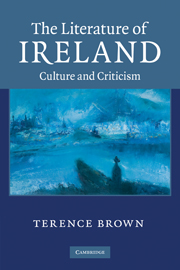Book contents
- Frontmatter
- Contents
- Acknowledgements
- Introduction
- 1 The Literary Revival: historical perspectives
- 2 Joyce's magic lantern
- 3 Music: the cultural issue
- 4 Modernism and revolution: rereading Yeats's ‘Easter 1916’
- 5 Shakespeare and the Irish self
- 6 Irish literature and the Great War
- 7 Ireland, Modernism and the 1930s
- 8 Post-modernists: Samuel Beckett and Flann O'Brien
- 9 Patrick Kavanagh: religious poet
- 10 MacNeice's Irelands: MacNeice's islands
- 11 Louis MacNeice and the Second World War
- 12 MacNeice and the puritan tradition
- 13 John Hewitt and memory: a reflection
- 14 Michael Longley and the Irish poetic tradition
- 15 Seamus Heaney: the witnessing eye and the speaking tongue
- 16 Derek Mahon: the poet and painting
- 17 Telling tales: Kennelly's Cromwell and Muldoon's ‘The More a Man Has the More a Man Wants’
- 18 Redeeming the time: John McGahern and John Banville
- 19 ‘Have we a context?’: transition, self and society in the theatre of Brian Friel
- 20 Hubert Butler and nationalism
- 21 The Irish Dylan Thomas: versions and influences
- Index
- References
9 - Patrick Kavanagh: religious poet
Published online by Cambridge University Press: 05 June 2012
- Frontmatter
- Contents
- Acknowledgements
- Introduction
- 1 The Literary Revival: historical perspectives
- 2 Joyce's magic lantern
- 3 Music: the cultural issue
- 4 Modernism and revolution: rereading Yeats's ‘Easter 1916’
- 5 Shakespeare and the Irish self
- 6 Irish literature and the Great War
- 7 Ireland, Modernism and the 1930s
- 8 Post-modernists: Samuel Beckett and Flann O'Brien
- 9 Patrick Kavanagh: religious poet
- 10 MacNeice's Irelands: MacNeice's islands
- 11 Louis MacNeice and the Second World War
- 12 MacNeice and the puritan tradition
- 13 John Hewitt and memory: a reflection
- 14 Michael Longley and the Irish poetic tradition
- 15 Seamus Heaney: the witnessing eye and the speaking tongue
- 16 Derek Mahon: the poet and painting
- 17 Telling tales: Kennelly's Cromwell and Muldoon's ‘The More a Man Has the More a Man Wants’
- 18 Redeeming the time: John McGahern and John Banville
- 19 ‘Have we a context?’: transition, self and society in the theatre of Brian Friel
- 20 Hubert Butler and nationalism
- 21 The Irish Dylan Thomas: versions and influences
- Index
- References
Summary
Patrick Kavanagh possessed an unusually powerful intellect. This made him a caustic, even occasionally brutal, critic of his contemporaries and an acute commentator on Irish life, its social forms and its psychological deformations. The power and force of his poems The Great Hunger, Lough Derg, the knowledgeable intimacy with his own place in Tarry Flynn, are now recognised as among the most authentic reports from an indigenous Irish world which, since William Carleton opened its realities to inspection in the nineteenth century, had endured various forms of literary misrepresentation, exploitation and creative re-invention. In granting Kavanagh this intimacy with what is reckoned by many of his admirers as the literary authentic, a kind of critical consensus has developed which fails to take account of the subtlety and sophistication, the power indeed, of Kavanagh's mind as it operates on an area of experience other than the social and psychological: the religious.
To make such a claim, however, is to fly in the face of several attributes of his oeuvre which would tend to make such a claim seem difficult to defend. There is the somewhat pallid pietism of the early verses, with their shy, chaste Mariolatry and too ready acquiescence in religiose emotion:
Here I wait
On the world's rim
Stretching out hands
To seraphim.
There is also the tiresome invective in his many obiter dicta against Protestantism which verge on the ignorance of mere sectarianism, as there is his simplistic identification of Catholicism with a true Ireland, which makes him seem at times as critically limited as any Irish Irelander or narrow nationalist possessed of stereotypes and myths of an essential Irishry.
- Type
- Chapter
- Information
- The Literature of IrelandCulture and Criticism, pp. 122 - 130Publisher: Cambridge University PressPrint publication year: 2010



